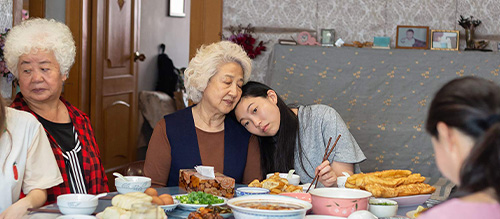The Farewell (2019) Review
The Farewell (2019)
Director: Lulu Wang
Screenwriter: Lulu Wang
Starring: Awkwafina, Zhao Shuzhen, Diana Lin, Tzi Ma, Lu Hong
At first glance, The Farewell looks like typical indie-family-dramedy fare; we’re presented with an oddball creative protagonist who has a complicated relationship with her family, and thus a comedy of awkwardness and an unconventional examination of grief ensues – this could have just been the Chinese-American Garden State. You begin by thinking that it’s going to be predictable and that it’s going to be an impossible task to convince you that lying to a relative about terminal illness could actually be kind, could be the most loving thing to do. By the end of The Farewell, writer-director Lulu Wang has well and truly buried all these assumptions.
Inspired by Lulu Wang’s real family experiences (or, “based on a true lie”) we follow struggling Asian-American writer Billi (Awkwafina) who returns to China to visit her dying Nai Nai. Nai Nai (Zhao Shuzhen) hasn’t, however, been told that she’s dying from terminal cancer, and the family hurriedly plan a wedding to give everyone an excuse to turn up on her doorstep out of the blue.
Attitudes towards cancer in the West are pretty simple – everyone fears it to the point of paranoia and most families and medical professionals would try to be as up-front as possible to provide the sufferer with the best possible care and support. In China this doesn’t seem to be the done thing and, if you can spare your loved one from the pain of knowing, then you don’t tell them. There’s a great scene where the family have all rushed to hospital after Nai Nai has a bad turn and Billi has a frank conversation with the English-speaking doctor (Lin Hong) in full view of her grandmother. The doctor agrees with what Billi’s family are doing, by-the-by, it’s just the way things are in China.
Other killer scenes in the film include a passive-aggressive East v West family dinner, complete with a succession of delightful looking dishes rotating agonisingly slowly around the table of squabbling relations. The subject of life in China and the USA comes up pretty quickly, in addition to whether you can always consider yourself Chinese after you move away, and what kind of a betrayal this represents. As a known food culture, where else would this family’s first difficult summit take place but in a slap-up restaurant?
The film also features the most pragmatic and yet spiritual and funny gathering by a grave-side family you could possibly imagine. This visit, which marks the anniversary of Nai Nai’s husband’s passing, mostly consists of people eating, drinking and smoking over the deceased man’s shrine to pass these pleasures on to the dearly departed: “He gave up smoking! / No he didn’t / What harm can it do him now?”.
A repeated symbol Lulu Wang uses is a bird finding its way indoors and refusing to be set free. One appears in Billi’s New York apartment and again in her hotel room when she arrives in China. Is this a stand-in for the fragile secret of Nai Nai’s illness, that Billi wants it out there in the open as a kindness but nature is preserving the harmony amongst the family by keeping it safely locked inside?
Though it’s never explicitly stated, Nai Nai knows that she’s dying, of course she does – she performed the same act of deception on her own father in decades past. She knows and she knows that her family know yet have chosen to save her from despair – the cycle of love and affection is preserved. In one of the closing scenes she and Billi exchange a look and say everything they need to each other without words.
Alex Weston’s fascinating score envelops and lifts this grounded story; it’s part classical, part traditional Chinese instrumentation and part opera, with Lulu Wang on piano and Mykal Kilgore’s beautiful, ethereal vocalisation leaving an indelible impression.
A shadow falls over much of the film, the shadow of guilt and deception, but it’s well balanced with levity. The final jolt of joy we need as an audience in the film’s final act comes in a wedding scene. People make bad speeches, sing badly and lose at drinking games; Nai Nai even gets to reconnect with some of her elderly wartime comrades and it sounds like she was a force to be reckoned with back in the day.
Performances across the board are excellent, but deserving of particular recognition are Awkwafina, who is almost unrecognisable in a subdued dramatic role after being the wild one in Crazy Rich Asians, Zhao as the heart and soul of the story, and Diana Lin who is wonderful too as Billi’s conflicted mother.
The Farewell is delicately crafted, far from black-and-white in its morals and full to the brim with heart and intelligence. It’s a very special, bittersweet treat that marks Lulu Wang out as a vivid talent.
Score: 23/24


